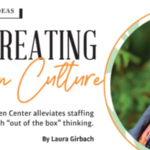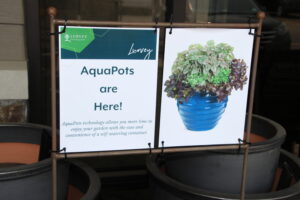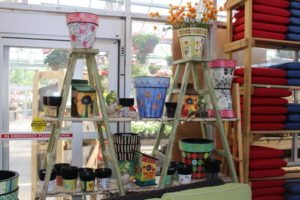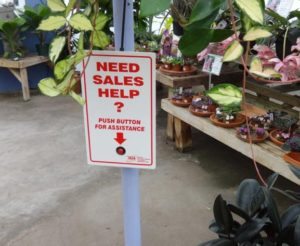
The importance of treating garden center customers as guests
A few fundamental questions for you to ponder: Are you selling plants or providing solutions and fulfilling the needs and expectations of your customers? Are you in a transactional mindset, selling one plant at a time, or providing compelling reasons for your customer to come back frequently to enjoy the benefits of plants and flowers? Is your approach to your business product focused or consumer focused? Do you spend more resources (time, money, energy and effort) on honing your operational capabilities or on creating opportunities for your customers to have great experiences with you and your business? Is the term “customer lifetime value” in your vocabulary?
The obvious response most of us would give to these questions is that we both sell plants and provide great experiences. But which approach provides the best path for the customer to see a differentiation between you and your direct competitors (or any other retailer — brick and mortar or online) to get them through your front doors for the first time and then return again and again? Your brand and brand message must be clear, specific and not confusing in any way. Everything you do in your store — from marketing to merchandising, from assortment to staffing, from product maintenance to store ambiance — must be in sync and be consistent. I’ve voiced my support for a consumer-focused approach in past articles and continue to believe that that’s the right way to go in today’s marketplace. And who and why you hire staff is a major element in communicating and executing what your brand stands for and what the customer sees.
The Disney (and Target) Effect
Many, many moons ago, I had the opportunity of a lifetime — to build a national presence for lawn and garden for Target (Target once had year-round garden centers in Florida, California, Arizona and Nevada, as well as seasonal, free-standing garden centers in the Midwest, and they still have decorative lawn and garden in all stores today).
Back in the early ‘90s, Target execs identified the opportunity and need to change their focus from sales and operations to a laser focus on their customer. Rather than try to affect this change internally, they went to the best-in-class company that wrote the book on consumer focus and creating unparalleled experiences: Disney (think Walt Disney World and how they use their team members to help deliver the Disney experience). Disney shared all their secrets and training techniques to ensure that their customers were truly treated as “guests,” and Target used this knowledge and these practices to change their own culture, also referring to their shoppers as guests and everything that this word implies.
To this day, Target doesn’t have customers; it has guests. And everything it does, from remodeling stores to tailoring their assortments to the local community, to their marketing and merchandising, to implementing new policies and programs (like introducing a process where the guest can make a product return from their car, without going into the store) is focused on enhancing the guest experience. On a few of my recent shopping trips to my local Target store, I couldn’t find what I wanted, so I asked a part-timer stocking shelves where I might find it. He or she reached for a device on their belt (all employees have these devices), typed the product name in, and the device displayed the specific aisle, fixture and shelf location. And rather than just pointing me in the right direction, every one of these team members physically took me to the product, sometimes completely at the other side of the store. I sure felt like a guest in their store!
Oh, and as Target changed to a consumer-forward culture, it also understood that it was the people who faced the guest every day, those who helped create the guest experience who were the ones who needed to embrace and execute to achieve their desired culture goals. The relationship between the boss and the employee needed to change to one of cooperation to achieve a common goal. Store managers became store team leaders; employees became team members.
Customer-Focused Culture
I was somewhat skeptical that the whole corporation could rally around a bunch of warm and fuzzy words and ideas. But I was wrong! There were solid, concrete actions and activities behind the words and, over time, the desired culture change took root. Everyone, from the CEO to the part-timer on the store floor, not only talked the talk, but they also walked the talk (and still do)!
Small businesses pay attention and care very much about each and every customer. Yet, are we hiring the right people to be able to deliver the customer experience to achieve our corporate goal of being consumer focused? If you believe that a differentiated customer experience is a primary driver in getting customers through your front door, initially and on a recurring basis, it behooves us to understand what drives their shopping decisions. They’re coming to you not because you have the cheapest prices, but for solutions, for knowledge, for information, for confidence to tackle their project, for ideas and for inspiration. They’re coming to you seeking someone who can meet these “soft” needs and make them feel good about their decision to come to you in the first place.
Bottom line: Customers are looking for someone who cares about them. Most shoppers are coming to you with a need, looking for you to provide and recommend the solution. Very few know exactly what they want when they walk into your store. They want to purchase a plant, but what they really want is someone to guide them through the process leading to the plant purchase! Plants and flowers become the means of providing the solutions they seek.
As a rule, we tend to hire people who have demonstrated success and experience in sales and, ideally, have some plant knowledge, and then we spend time training them on the operational and technical (i.e., product) aspects specific to your business. And we give them titles like sales associate and customer service associate. Wouldn’t it make more sense to give them titles that the customer can relate to, titles that better describe their role in your company, such as customer care specialist or, better yet, guest care specialist?
Now, the desired traits that you should look for in hiring a guest care specialist are far different than in hiring a product specialist. For a guest care specialist, you should hire for character, integrity, honesty, empathy, friendliness, personality, willingness to ask probing questions, problem solving skills, and an attitude that winning isn’t just making a sale but providing a solution that satisfies the guest’s needs. It’s important to note that a leader such as yourself can’t dictate caring in your team, but you can create a culture that cares, and you can hire people predisposed to caring. It’s also essential that this guest care philosophy be in sync with your brand message; your specialists are the face of your brand to your guests and part of their role is to reinforce your brand.
I’m not suggesting that product knowledge isn’t important, but it’s far easier to teach the technical information than it is to teach and infuse the traits noted above that make for a successful guest care specialist.
The two most critical training needs for guest care specialists are:
- Knowing the right questions to ask the guest so that the specialist can gather all the pertinent information needed to provide the best options to the guest.
- Having or knowing what and where the internal resources are to help the specialist identify the correct responses to the guest’s problems and needs.
Customer Care in the Garden Center
Last fall, I visited Bachman’s, one of my favorite garden centers here in Minnesota. I wanted to plant an evergreen screen between my house and a neighbor’s house, and I had no initial preference on what plants were suitable.
Bachman’s is well known for its staff’s plant knowledge, and the young lady I spoke with was no exception. But before making any product recommendations, she asked a series of probing questions. Do we have to be concerned with property lines and height/width as the plants mature? How about sun and shadows from the houses and existing trees? Do we have critter (deer) issues, water drainage and soil condition issues?
As product knowledgeable as Bachman’s associates are, they all carry a plant reference book in their apron that they almost always access, just to make sure they have reviewed all the possible options before they offer their recommendations. For the record, I’m sure the associate could have provided me with their recommendation without referencing the book, but my confidence level increased dramatically when she validated their response with the info in the book. While I don’t know where Bachman’s reference book comes from, possibly self-published, there is plenty of great info available from university Extension websites, and from Master Gardeners’ publications and training guides.
Words and phrases like guests, caring (and the traits that are embodied in it such as integrity, empathy, character and problem solver/solution providing) are powerful, especially when you and — more importantly — your guests understand what they mean to them and the experiences they have with you. Incorporating these types of aspirational attributes into your company culture and brand message and then executing them at point of purchase can truly be game changers for your business. And the most effective brand messengers you have are your front-line employees. Focus on your guests and your team members and you might just become a believer in the power of your new culture.
It’s all about focus.
For an enhanced reading experience, view this article in our digital edition.


















 Videos
Videos





